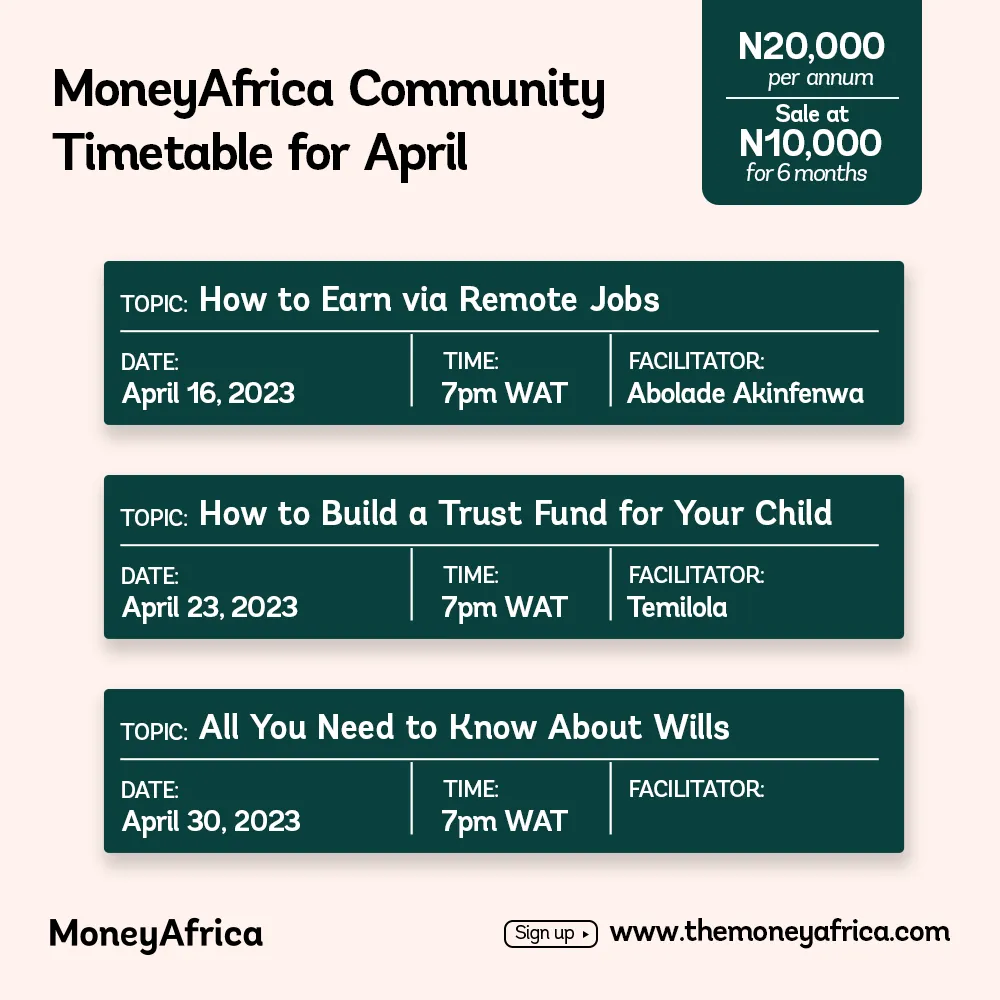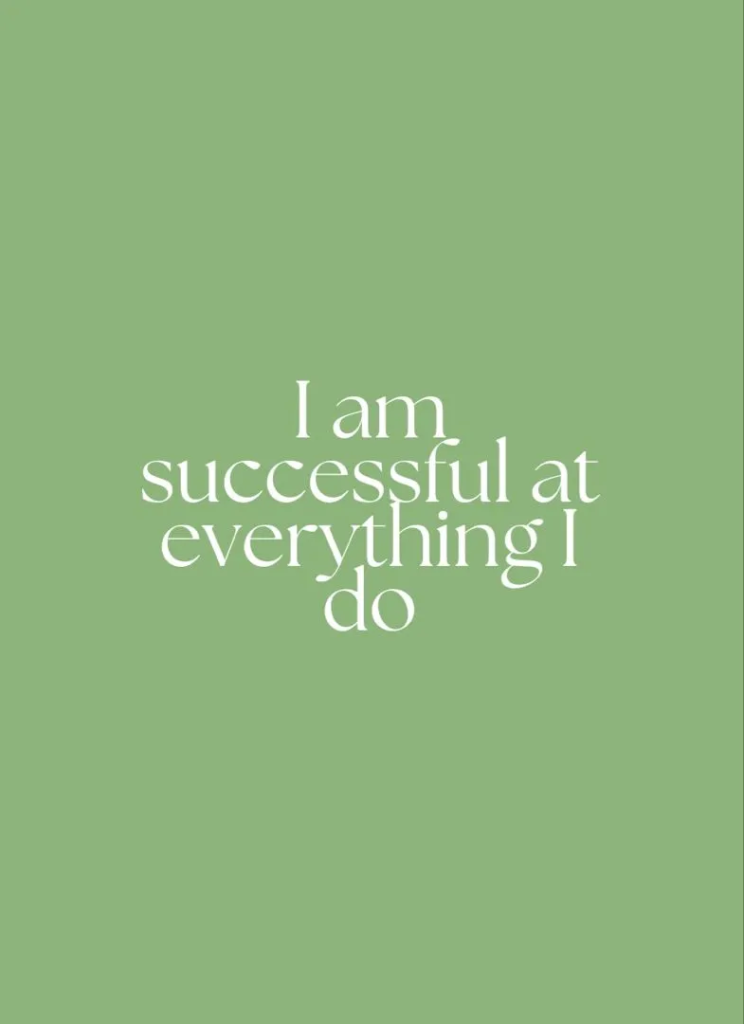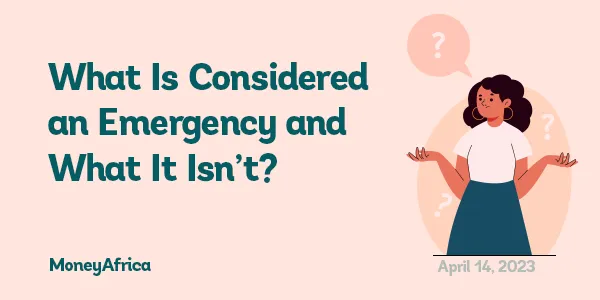Good Morning 😃
How are you doing?
Friday letters are usually dedicated to taking questions from our community. Do you have a question for us? Please feel free to
- send an e-mail to info@themoneyafrica.com; or
- send a DM to any of our social media channels, or
- simply fill out this form. Don’t worry, your responses are kept anonymous.
**
Question
No matter how little or how much I make every month, I’m never able to save. If I don’t invest it immediately, I spend it on some “emergency,” and that’s where the problem lies. What is considered an emergency and what it isn’t? Apart from health issues, are there other emergencies? Is it peculiar to every individual?
Answer
An emergency expense is typically an unexpected, urgent expense that cannot be put off without significant consequences. For example, a sudden car repair, a broken water heater, or a necessary medical expense.
What constitutes an emergency expense can vary from person to person based on their individual circumstances and priorities.
For example, someone who relies heavily on their car for work may consider a car repair to be an emergency, while someone who lives in an area with reliable public transportation may not.
Examples of emergencies that may require the use of an emergency fund are:
- Job loss or a significant reduction in income
- Medical issues not covered by insurance
- Unexpected vehicle faults or damage that need repairs
- Urgent situations that require travelling
- Legal fees
Alternatively, expenses that are not usually considered emergencies are:
- Planned expenses, such as a vacation
- Purchasing a new car
- Regular bills or expenses, such as rent, utilities, or groceries
As a general rule, if the expense is unexpected, urgent and necessary, it may be considered an emergency that can be covered by your emergency fund. Establish a budget and prioritise your expenses to help avoid spending money on non-emergencies.
Furthermore, set up an emergency fund specifically for unexpected expenses, so that you have a cushion to fall back on when these situations arise.
Did you know you can do this on the Ladda app? Download Ladda now to start saving for your emergency fund.
***
Question
I have a lot of high-demand skills but I can’t seem to get a job. I’m a student of the University of Nigeria, Nsukka. I’m proficient in coding, web development and mobile development, graphic design, UI design, and SEO but somehow I still haven’t gotten even a single job. I’ve signed up on Upwork, freelancer.com, and LinkedIn but still nothing.
Answer
To start with, update your resume and portfolio. Make sure your resume and portfolio accurately reflect your skills and experience. Showcase your best work and make sure your resume highlights your relevant experience and education.
Also reach out to family, friends, and acquaintances who may be able to help you find work. Attend industry events or join online communities related to your field to connect with others and potentially find job opportunities.
Make sure you’re applying for positions that are a good fit for your skills and experience. Reach out to companies or recruiters directly to express your interest in working with them.
In addition, stay up-to-date on the latest trends and technologies in your field, and continue to develop your skills through courses, workshops, and other learning opportunities. This can help you stand out from other candidates and make you more competitive in the job market.
You can as well consider freelancing or taking on project-based work to build up your portfolio and gain more experience.
In conclusion, pay attention to what’s happening in Nigeria. Follow the Nigerian media and people who work in that space.
Keep applying, keep networking, keep improving your skills and experience and don’t give up!
Thank you for reading Money Africa’s Blog.
Please feel free to share it.
Do you have any questions? You can send an e-mail to info@themoneyafrica.com or send a DM to any of our social media channels.
***
MoneyAfrica premium plan
Are you a mid to high-income earner? Do you find communities a bit too busy? You should sign up for our premium plan.

You can learn more about that here.
***
We often get questions regarding how to plan your finances to align with your relocation plans, especially for students seeking to further their studies. As always, we have heard you, and we have put together an e-book to help you navigate this. Follow this link, to get your FREE copy of the e-book: The Japa Encyclopedia.
***
Get our annual subscription and learn more about investing safely and building a solid portfolio in 2023.

Don’t forget to:
- Join our community, if you want to smash your 2023 financial goals. It takes at least 30 days to build great habits that will last you a lifetime. So why not start now? There is a lot you can achieve.
- If you would like to document your financial journey in 2023, then our journal would be an excellent fit for you. It costs ₦7,500 (excluding delivery).
- Get a budget sheet to track your monthly expenses. Click here
- Get an investment tracker to be on top of all your investments. Click here
MoneyAfrica is a financial literacy platform. Our goal is to make everyone better with their finances.
We do this by engagements via our:
– social media handles
– platforms for paid community members (for adults and students)
– webinar sessions with corporate clients
Would you like to join any of the communities? Please click here
Would you like us to hold a webinar for your company? Please send an email to info@themoneyafrica.com


